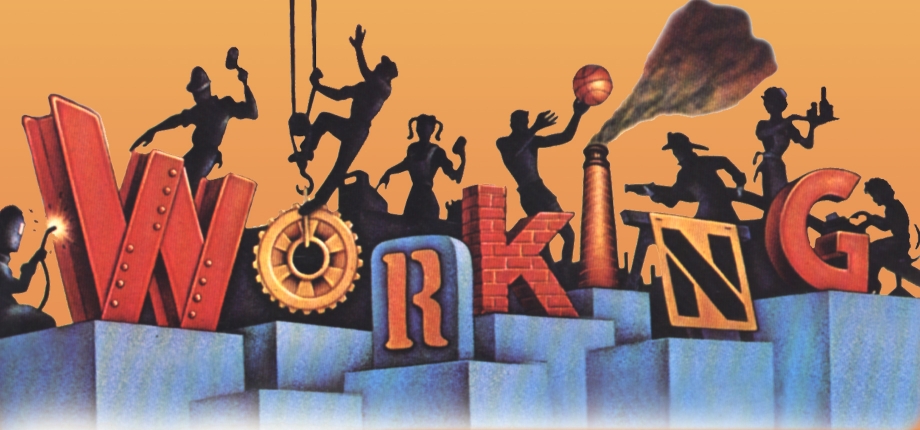Filichia Features: WORKING with Real Workers

Filichia Features: WORKING with Real Workers
Daniel C. Levine had an idea that Stephen Schwartz loved.
Schwartz is of course the composer-lyricist whose first three shows -- Godspell, Pippin and The Magic Show -- were smash-hits.
By July, his Wicked will have outrun all of them combined.
Levine is the artistic director of ACT of Connecticut, the state's new Equity theater located in Ridgefield. He chose a different Schwartz show to do: Working.
The 1978 musical was based on Studs Terkel's 1974 series of interviews subtitled People Talk About What They Do All Day and How They Feel About What They Do . Workers were of different ages, races and income levels.
Schwartz wrote some songs but noting the book's diverse nature, he commissioned disparate writers to pen others: African-American Micki (Don't Bother Me, I Can't Cope) Grant; ol' pro Mary ( Once Upon a Mattress) Rodgers; then-newcomers and future Tony-nominees Susan Birkenhead and Craig Carnelia. Even pop songwriter James Taylor told Schwartz "You've got a friend" and contributed.
The result was a Tony-nominated score.
Last year, Levine wanted interview and video Ridgefieldians who do jobs identical or similar to the ones in Working. He'd use what they said to comment on scenes and songs.
Schwartz approved so Levine was off and taping. He says: "When I asked Rosie the deli owner what her dreams were, she said 'I love clothes, and if I was a fashion designer, I would've been an awesome fashion designer.'"
That segued to Grant's song that begins "If I could've been what I could've been, I could've been something."
Limousine-driver Wayne spoke of his childhood: "My mother, when she was a younger woman -- when my father had a heart attack -- had to leave the home and work in a factory."
That revelation led to Taylor's "Millwork." It shows a factory worker who assembles an entire suitcase in 40 seconds - and 800 in a shift.
Oscar, who prunes trees, said "I think I'm pretty good at it" before adding "It's exciting to be up in a tree. It's outside; you can see nature. It's better than having to go to an office."
Levine positioned this clip before the show's office scene. Harsh overhead lighting reflected harsh feelings between management and labor.
MTI president Drew Cohen said that Schwartz "felt that the incorporation of current video connected the audience to the production in a more significant way. Although the show has aged remarkably well, the new interviews helped keep a 40-year-old piece very current."
Cohen added that Schwartz "wants us to prepare templates in the show materials for other groups to pilot this concept. If those productions work well, we would consider making the 'add-your-own-video' version available for licensing."
Working shows that some people do like their jobs. The Trucker drives with the zest of a teen playing a video game. The Waitress feels that "It's an Art" to do what she does well (in one of Schwartz's best-ever songs).
But The Policeman who almost shot an innocent man resigned and left to become The Fireman who now rescues people instead. ("Someone can grow old because of me.") The Cleaning Women envision when their daughters won't have to do this menial job.
Some songs changed with the times. Now, The Teacher (in a Rodgers-Birkenhead song) mentions "weapons and drugs" as problems. Joe, The Retiree, no longer remembers "Pretty Baby" and "Tea for Two" but "My Girl" and "Good Vibrations." A Fred Ebb lyric says "Life is what you do while you're waiting to die", but Joe (in Carnelia's song) sees it differently.
Says Schwartz, "Working is flexible enough to be performed by virtually any number of actors, depending on the director's needs and desires." In fact, for the upcoming Off-Center Encores! Production (June 26-29), nine performers will do the show. Interviews with current-day workers will also be interpolated.
Levine employed three women and three men; all differentiated their characters so well that when a new one entered, you'd swear you hadn't seen that performer before.
This reduction from the original 17 performers was actually conceived by Gordon Greenberg in his award-winning 2012 production. At that time, Working was updated into an 80-minute intermission-less version. It included two songs by someone who wouldn't be born for 612 days after the show's original May 14, 1978 debut: Lin-Manuel Miranda. After he'd scored with his 2008 hit In the Heights , Schwartz seized the chance to add his voice to the score.
After Joe relied on a cane to exit, The Caregiver entered and sang Miranda's "A Very Good Day." He related that Joe sometimes "can't remember who he is, but today he was lucky." At the other end of the spectrum a nanny noted the challenges of a five-year-old on her very good day.
Miranda's "Delivery" showed a McDonald's employee ("I smell like a burger") who bikes food to customers. It reiterated how many work for minimum wage - and are grateful when they hear "Keep the change."
For now, Working will keep the changes: Ritalin and iPhones, not around in 1978, may someday be dated, too. But The Teacher, The Waitress, The Caretaker - and the workers in your town -- make Working ever-relevant.
You may e-mail Peter at pfilichia@aol.com. Check out his weekly column each Monday at www.broadwayselect.com and Tuesday at www.masterworksbroadway.com . He can be heard most weeks of the year on www.broadwayradio.com.

























